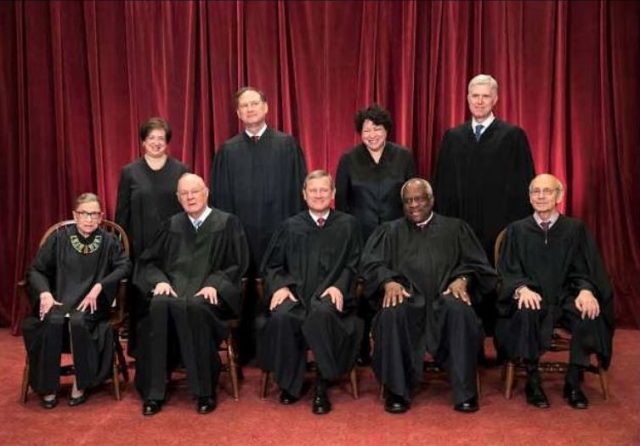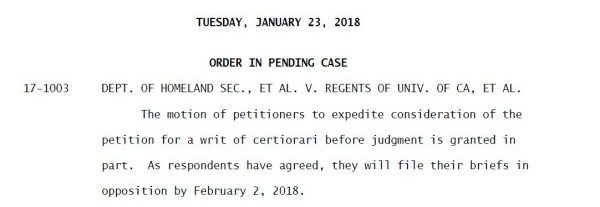Supreme Court to expedite consideration of Trump request to hear DACA case
If granted, would allow Trump administration to circumvent 9th Circuit in attempting to overturn District Court injunction against terminating DACA

After a bizarre and completely unfounded San Francisco federal District Court injunction against the Trump administration wind-down of DACA, the Trump administration both filed for leave to appeal in the 9th Circuit and filed a Petition for a Writ of Certiorari Before Judgment in the Supreme Court. That latter Petition would circumvent the 9th Circuit.
The Trump administration, however, did not ask the Supreme Court to stay the District Court order, arguing that a stay would create more problems in the administrative wind-down of DACA:
This Court’s immediate review is warranted. The district court has entered a nationwide injunction that requires DHS to keep in place a policy of non-enforcement that no one contends is required by federal law and that DHS has determined is, in fact, unlawful and should be discontinued. The district court’s unprecedented order requires the government to sanction indefinitely an ongoing violation of federal law being committed by nearly 700,000 aliens—and, indeed, to confer on them affirmative benefits (including work authorization)— pursuant to the DACA policy. That policy is materially indistinguishable from the DAPA and expanded DACA policies that the Fifth Circuit held were contrary to federal immigration law in a decision that four Justices of this Court voted to affirm. Without this Court’s immediate intervention, the court’s injunction will persist at least for months while an appeal is resolved and, if the court of appeals does not reverse the injunction, it could continue for more than a year given the Court’s calendar.
To be sure, some of these harms could be avoided by a stay of the district court’s order. But a primary purpose of the Acting Secretary’s orderly wind-down of the DACA policy was to avoid the disruptive effects on all parties of abrupt shifts in the enforcement of the Nation’s immigration laws. Inviting more changes before final resolution of this litigation would not further that interest. Moreover, a stay would not address the institutional injury suffered by the United States of being embroiled in protracted litigation over an agency decision that falls squarely within DHS’s broad discretion over federal immigration policy and that is not even judicially reviewable. A stay also would not address the risk that the onerous discovery and administrative record orders that already justified this Court’s intervention will be reinstated and create the need for additional rounds of interlocutory appellate review. Accordingly, the government respectfully submits that the most suitable and efficient way to vindicate the law in these unique circumstances is to grant certiorari before judgment and resolve the dispute this Term.
Instead of seeking a stay, the Trump administration subsequently filed a Motion to Expedite (pdf.)(embed at bottom of post) consideration of the Cert. Petition and order the plaintiffs to file their response quickly. The Court just granted that request:
The motion of petitioners to expedite consideration of the petition for a writ of certiorari before judgment is granted in part. As respondents have agreed, they will file their briefs in opposition by February 2, 2018.

This may be an indication the Supreme Court is seriously considering taking the case in such an expedited fashion. As Amy Howe at ScotusBlog pointed out at the time the Cert. Petition was filed, this is the exception not the rule:
As the attorney general acknowledged, it is indeed rare for a losing party to ask the Supreme Court to weigh in before the court of appeals has had a chance to rule. The Supreme Court’s rules indicate that certiorari before judgment “will be granted only upon a showing that the case is of such imperative public importance as to justify deviation from normal appellate practice and to require immediate determination in this Court.” As Kevin Russell has observed, the court has granted review before judgment “in only a handful of cases over the last seventy-five years.” Most of those cases, Russell wrote, fall into one of at least three categories: The justices granted review to allow the court to hear a case at the same time as another one that it had already agreed to review through normal channels; the federal government petitioned for review; or the cases involved “international relations and presidential authority, particularly in the context of the president’s war powers.” The DACA case obviously meets the second criterion; we’ll know soon whether the justices will agree that the case is so important that it warrants immediate review.
If the Supreme Court takes the case, it will have so super-expedite briefing and oral argument if it is to be resolved this term (by the end of June). The Supreme Court may want to do so since it is facing an ever-increasing number of nationwide injunctions by lower courts disrupting the normal administration of executive branch powers, such as the multiple visits to the Supreme Court (and multiple stays issued) involving the Trump Travel Orders.
The NY Times note just a few days ago how the federal district courts have taken it on themselves to serve as a political check on the executive, with DACA being just the latest example, A DACA Question: Should Judges Use Local Cases to Halt National Orders?
When a federal judge in California ordered a stop last week to a key plank of President Trump’s immigration agenda, he revived a debate that has simmered in this age of partisanship: the role of the impartial judiciary in American democracy.
The judge, William Alsup of the Northern District of California in San Francisco, used a local case to impose a nationwide stop on Mr. Trump’s order to end a program that protects young undocumented immigrants in the United States.
The tactic has gained popularity among federal judges as a tool to combat perceived executive overreach. But legal scholars say it is helping to erode the idea of an impartial judiciary, and Judge Alsup’s decision opened him to critiques that he overstepped his boundaries by applying national orders in a regional case….
The use of local cases to issue national orders occurred only a few times until President Barack Obama’s second term, when Republican state attorneys general turned to that strategy about half a dozen times to stop some of his major initiatives….
When appeals courts do not block these injunctions, the Supreme Court can be forced to intervene, as it did with the Obama-era immigration case.
There is speculation that the Supreme Court will address universal injunctions in the coming year. “The justices don’t like the districts courts changing national policy overnight,” said Josh Blackman, a professor at South Texas College of Law Houston.
———————-
Regents v. Trump – DACA – Trump Motion to Expedite Cert Petition by Legal Insurrection on Scribd
Donations tax deductible
to the full extent allowed by law.








Comments
I’m starting to get the feeling that Judge Alsup and the 9th Circuit have finally ticked off some folks higher up who know better and are tired of this foolishness.
I’m looking for a 6-3 smackdown. Any takers?
I’m thinking it could even go 9-0, not due to the underlying policy, but because the SCOTUS can get pretty touchy when they start to think that lower courts are beginning to get comfortable usurping territory that rightly belongs to the SCOTUS.
A 9-0 would amount to a big B-slap. I would love love that.
I’d be mildly surprised if it isn’t 9-0. The lower courts have been warned…
But your anti-Trump butt-buddies like Ruth can’t be counted on.
whether or not SCJ Ginsburg likes DJT or not, she has her legal reputation to think of.
Now that her buddy Antonin Scalia is gone, her husband is gone (2010) and she is in poor health, she must think about her reputation on the SCOTUS.
Mr. Servo: I would hope for a unanimous court for such a momentous decision, but I am skeptical that Justices Ginsburg and Sotomayor will be able to choke back their rather blatant partisanship. Still, I hope that you’re right and I’m wrong.
I’m hoping you’re right, but am expecting 5 to 4 with the girls and Kennedy ruling against America.
Keep in mind that our Chief Justice has proven in the past that he is susceptible to pressure and extortion from the Left. The Left desperately needs a victory on this matter now. Do not trust Roberts to rule against the Left on this. It may be 5-4 the other way.
If they were going to do that then why wouldn’t they just let the ninth have it first?
If the Supreme Court slaps down Trump soon even of only based on personal politics, it counters some of the losses the Left has had recently. Expecting the law or the Constitution to have any part of court rulings is so last century.
The collapse of the Russian collusion fable, the abuse of FISA, the FBI openly defying subpoenas for material that they “accidentally lost”, and the revelation of FBI “secret society” meetings to overthrow Trump on top of the Schumer Shutdown leaves the Left desperate for a victory soon by any means.
Keep in mind that Obama was slapped down by SCOTUS several times in 9-0 rulings. Mostly for Executive overreach.
Will they fee the same about Judicial overreach?
hmmmm….could be
Question for the legal beagles: why do district and circuit courts get to make rulings that affect the entire nation? Was it always that way or is that a more recent development? Seems like a little out of the way judge looking to make a name for himself has the ability to outsmart Presidential policy and Congressional law. Doesn’t seem like that is the way the system was supposed to work.
true and with a sufficient number of reversals they need to be retired willingly or not.
“Three strikes and you’re out.”
It’s a good, fair question, and one outside of my wheelhouse.
I’ll venture that it’s a matter of the Constitution, as aside of all other questions of law.
If that’s the case, it impacts all the nation as a whole.
Heard by the”Wise Latina” who cant even figure out how to control her blood sugar.
You win the Nobel Prize for comments this year.
Justice Sotomayor, age 63, incurred Type I Diabetes at age 7 though untreated until age 9. Being born (1954) pre-1965 when this disease was just starting to be addressed with medication and diet as it is today, the fact that women with type 1 diabetes of that era have an average life expectancy of about 68 years. Even that stated, there are the other issues of fallout of other organ failures due to the life long disease which cause many physical and mental disabilities which treated can extend life with life support treatments. When Pres. Trump commented last year and said,””Her health. No good. Diabetes,” ” he was pretty close to this out come if only to have used 5 words.
1/19/18 – Justice Sotomayor experienced symptoms of low blood sugar at her home this morning,” Kathy Arberg, a spokeswoman for the court, told the Washington Examiner. “She was treated by D.C. Emergency Medical Services”
While I wish no harm on any other person, it was pretty damn stupid of Obama to pick a Dem with a known medical problem like that for the Court. It could pay off big for GE Trump.